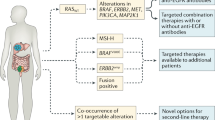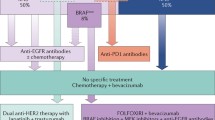Abstract
Biomarkers with predictive value and, to a lesser extent, prognostic value hold the potential to revolutionize the clinical practice of oncology. During the past 20 years, this has been an active field for basic and translational research in colorectal cancer, but no validated biomarkers have been identified or have become routine tools in clinical practice. The past decade has seen significant developments, with translational research projects being allied to randomized trials and the first fruit being borne with the identification of mismatch repair status, KRAS mutations, and possibly topoisomerase 1 expression as biomarkers with the potential to guide clinical practice.

Similar content being viewed by others
References
Papers of particular interest, published recently, have been highlighted as: • Of importance •• Of major importance
Johnston PG, Fisher ER, Rockette HE, et al.: The role of thymidylate synthase expression in prognosis and outcome of adjuvant chemotherapy in patients with rectal cancer. J Clin Oncol 1994, 12(12):2640–2647.
• Koopman M, Venderbosch S, van Tinteren H, et al.: Predictive and prognostic markers for the outcome of chemotherapy in advanced colorectal cancer, a retrospective analysis of the phase III randomised CAIRO study. Eur J Cancer 2009, 45(11):1999–2006. This randomized trial included a molecular pathology study assessing biomarkers of chemotherapy outcomes.
•• Braun MS, Richman SD, Quirke P, et al.: Predictive biomarkers of chemotherapy efficacy in colorectal cancer: results from the UK MRC FOCUS trial. J Clin Oncol 2008, 26(16):2690–2698. This large randomized trial included an assessment of predictive biomarkers of chemotherapy efficacy. The results indicated an association between the efficacy of irinotecan and oxaliplatin and the expression of Topo1 in tumor cells.
Roth AD, Tejpar S, Delorenzi M, et al.: Prognostic role of KRAS and BRAF in stage II and III resected colon cancer: results of the translational study on the PETACC-3, EORTC 40993, SAKK 60-00 trial. J Clin Oncol 2010, 28(3):466–474.
Longley D, Harkin D, Johnston P: 5-fluorouracil: mechanisms of action and clinical strategies. Nat Rev Cancer 2003, 3:330–338.
Popat S, Matakidou A, Houlston RS: Thymidylate synthase expression and prognosis in colorectal cancer: a systematic review and meta-analysis. J Clin Oncol 2004, 22(3):529–536.
Richman S, Braun MS, Adlard JW, et al.: Prognostic value of thymidylate synthase (TS) expression on failure-free survival of fluorouracil-treated metastatic colorectal cancer patients [abstract]. J Clin Oncol 2006, 24(18S):10011.
Lecomte T, Ferraz J-M, Zinzindohoue F, et al.: Thymidylate synthase gene polymorphism predicts toxicity in colorectal cancer patients receiving 5-fluorouracil-based chemotherapy. Clin Cancer Res 2004, 10(17):5880–5888.
Pullarkat ST, Stoehlmacher J, Ghaderi V, et al.: Thymidylate synthase gene polymorphism determines response and toxicity of 5-FU chemotherapy. Pharmacogenomics J 2001, 1(1):65–70.
•• Braun MS, Richman SD, Thompson L, et al.: Association of molecular markers with toxicity outcomes in a randomized trial of chemotherapy for advanced colorectal cancer: the FOCUS trial. J Clin Oncol 2009, 27(33):5519–5528. This large randomized assessment of molecular predictors of chemotherapy toxicity did not confirm the promise of several putative predictors of outcome, such as UGT1A1*28.
Schwab M, Zanger UM, Marx C, et al.: Role of genetic and nongenetic factors for fluorouracil treatment-related severe toxicity: a prospective clinical trial by the German 5-FU Toxicity Study Group. J Clin Oncol 2008, 26(13):2131–2138.
Collie-Duguid ES, Etienne MC, Milano G, McLeod HL: Known variant DPYD alleles do not explain DPD deficiency in cancer patients. Pharmacogenetics 2000, 10(3):217–223.
Raida M, Schwabe W, Häusler P, et al.: Prevalence of a common point mutation in the dihydropyrimidine dehydrogenase (DPD) gene within the 5′-splice donor site of intron 14 in patients with severe 5-fluorouracil (5-FU)- related toxicity compared with controls. Clin Cancer Res 2001, 7(9):2832–2839.
Mattison LK, Fourie J, Hirao Y, et al.: The uracil breath test in the assessment of dihydropyrimidine dehydrogenase activity: pharmacokinetic relationship between expired 13CO2 and plasma [2-13C]dihydrouracil. Clin Cancer Res 2006, 12(2):549–555.
Ribic CM, Sargent DJ, Moore MJ, et al.: Tumor microsatellite-instability status as a predictor of benefit from fluorouracil-based adjuvant chemotherapy for colon cancer. N Engl J Med 2003, 349(3):247–257.
Popat S, Hubner R, Houlston RS: Systematic review of microsatellite instability and colorectal cancer prognosis. J Clin Oncol 2005, 23(3):609–618.
•• Roth AD, Tejpar S, Yan P, et al.: Stage-specific prognostic value of molecular markers in colon cancer: results of the translational study on the PETACC-3, EORTC 40993, SAKK 60-00 trial [abstract]. J Clin Oncol 2009, 27(15S):4002. This article presents data from a large randomized trial demonstrating the prognostic impact of MMR deficiency in the adjuvant setting.
• Koopman M, Kortman GA, Mekenkamp L, et al.: Deficient mismatch repair system in patients with sporadic advanced colorectal cancer. Br J Cancer 2009, 100(2):266–273. This article demonstrates the low incidence of MMR deficiency in patients with advanced disease and provides further data suggesting the prognostic impact of MMR status on outcomes.
Meyers M, Hwang A, Wagner MW, et al.: A role for DNA mismatch repair in sensing and responding to fluoropyrimidine damage. Oncogene 2003, 22(47):7376–7388.
•• Sargent DJ, Marsoni S, Thibodeau SN, et al.: Confirmation of deficient mismatch repair (dMMR) as a predictive marker for lack of benefit from 5-FU based chemotherapy in stage II and III colon cancer (CC): a pooled molecular reanalysis of randomized chemotherapy trials [abstract]. J Clin Oncol 2008, 26(15S):4008. The authors confirm previous data from Ribic et al. [15] demonstrating the lack of effectiveness of 5-FU chemotherapy in MMR-deficient tumors.
Koopman M, Knijn N, Richman S, et al.: The correlation between Topoisomerase-I (Topo1) expression and outcome of treatment with capecitabine and irinotecan in advanced colorectal cancer (ACC) patients (pts) treated in the CAIRO study of the Dutch Colorectal Cancer Group (DCCG) [abstract O-6003]. Eur J Cancer 2009, 7S(2):321.
Richman SD, Thompson LC, Quirke P, et al.: Topoisomerase-1 (Topo1) as a predictive and prognostic factor in colorectal cancer chemotherapy [abstract P-6125]. Eur J Cancer 2009, 7S(2):360.
Ando Y, Ueoka H, Sugiyama T, et al.: Polymorphisms of UDP-glucuronosyltransferase and pharmacokinetics of irinotecan. Ther Drug Monit 2002, 24(1):111–116.
Rouits E, Boisdron-Celle M, Dumont A, et al.: Relevance of different UGT1A1 polymorphisms in irinotecan-induced toxicity: a molecular and clinical study of 75 patients. Clin Cancer Res 2004, 10(15):5151–5159.
Rahman A: Considerations for integration of CDRH and CDER regulations—a case study: irinotecan and UGT1A1. Available at http://www.fda.gov/Cder/Offices/OODP/presentation/rahman.pdf.
Roth AD, Yan P, Dietrich D, et al.: Is UGT1A1*28 homozygosity the strongest predictor for severe hematotoxicity in patients treated with 5-fluorouracil (5-FU)-irinotecan (IRI)? Results of the PETACC 3—EORTC 40993 -SAKK 60/00 trial comparing IRI/5-FU/folinic acid (FA) to 5-FU/FA in stage II–III colon cancer (COC) patients [abstract]. J Clin Oncol 2008, 26(Suppl 15):A-4036.
McLeod HL, Parodi L, Sargent DJ, et al.: UGT1a1*28 toxicity and outcome in advanced colorectal cancer: results from trial N9741 [abstract]. J Clin Oncol 2006, 24(Suppl 18):A-3520.
McLeod HL, Sargent DJ, Marsh S, et al.: Pharmacogenetic analysis of systemic toxicity and response after 5-fluorouracil (5FU)/CPT-11, 5FU/oxaliplatin (oxal), or CPT-11/oxal therapy for advanced colorectal cancer. Proc Am Assoc Clin Oncol 2003, 22:252.
Roth AD, Yan P, Dietrich D, et al.: Does UGT1A1*28 homozygosity predict for severe toxicity in patients treated with 5-fluorouracil (5-FU)-irinotecan (IRI)? Results of the PETACC 3-EORTC 40993-SAKK 60/00 trial comparing IRI/5-FU/folinic acid (FA) to 5-FU/FA in stage II–III colon cancer [abstract]. Presented at the American Society of Clinical Oncology 2008 Gastrointestinal Cancers Symposium. Orlando, FL; January 25–27, 2008.
Cecchin E, Innocenti F, D’Andrea M, et al.: Predictive role of the UGT1A1, UGT1A7, and UGT1A9 genetic variants and their haplotypes on the outcome of metastatic colorectal cancer patients treated with fluorouracil, leucovorin, and irinotecan. J Clin Oncol 2009, 27(15):2457–2465.
Toffoli G, Cecchin E, Gasparini G, et al.: Genotype-driven phase I study of irinotecan administered in combination with fluorouracil/leucovorin in patients with metastatic colorectal cancer. J Clin Oncol 2010, 28(5):866–871.
Mathijssen RHJ, Marsh S, Karlsson MO, et al.: Irinotecan pathway genotype analysis to predict pharmacokinetics. Clin Cancer Res 2003, 9(9):3246–3253.
• van der Bol JM, Mathijssen RH, Creemers GJ, et al.: A CYP3A4 phenotype-based dosing algorithm for individualized treatment of irinotecan. Clin Cancer Res 2010, 16(2):736–742. This article demonstrates the potential of using midazolam metabolism and clearance to guide irinotecan dosing.
Innocenti F, Kroetz DL, Schuetz E, et al.: Comprehensive pharmacogenetic analysis of irinotecan neutropenia and pharmacokinetics. J Clin Oncol 2009, 27(16):2604–2614.
Chester JD, Joel SP, Cheeseman SL, et al.: Phase I and pharmacokinetic study of intravenous irinotecan plus oral ciclosporin in patients with fluorouracil-refractory metastatic colon cancer. J Clin Oncol 2003, 21(6):1125–1132.
Stoehlmacher J, Park DJ, Zhang W, et al.: Association between glutathione S-transferase P1, T1, and M1 genetic polymorphism and survival of patients with metastatic colorectal cancer. J Natl Cancer Inst 2002, 94(12):936–942.
Chung KY, Shia J, Kemeny NE, et al.: Cetuximab shows activity in colorectal cancer patients with tumors that do not express the epidermal growth factor receptor by immunohistochemistry. J Clin Oncol 2005, 23(9):1803–1810.
• Smith G, Bounds R, Wolf H, et al.: Activating K-Ras mutations outwith ‘hotspot’ codons in sporadic colorectal tumours—implications for personalised cancer medicine. Br J Cancer 2010, 102(4):693–703. This article presents new data identifying additional mutations that may result in KRAS activation and resistance to EGFR-targeted treatment.
•• Amado RG, Wolf M, Peeters M, et al.: Wild-type KRAS is required for panitumumab efficacy in patients with metastatic colorectal cancer. J Clin Oncol 2008, 26(10):1626–1634. This article demonstrates the impact of KRAS mutation status on the outcome of patients treated with panitumumab.
•• Karapetis CS, Khambata-Ford S, Jonker DJ, et al.: K-ras mutations and benefit from cetuximab in advanced colorectal cancer. N Engl J Med 2008, 359(17):1757–1765. This article demonstrates the impact of KRAS mutation status on the outcome of patients treated with cetuximab.
• Richman SD, Seymour MT, Chambers P, et al.: KRAS and BRAF mutations in advanced colorectal cancer are associated with poor prognosis but do not preclude benefit from oxaliplatin or irinotecan: results from the MRC FOCUS trial. J Clin Oncol 2009, 27(35):5931–5937. This article demonstrates the prognostic impact of KRAS and BRAF mutations on the outcomes of patients treated with chemotherapy alone.
Van Cutsem E, Kohne CH, Hitre E, et al.: Cetuximab and chemotherapy as initial treatment for metastatic colorectal cancer. N Engl J Med 2009, 360(14):1408–1417.
Hecht JR, Mitchell E, Chidiac T, et al.: A randomized phase IIIB trial of chemotherapy, bevacizumab, and panitumumab compared with chemotherapy and bevacizumab alone for metastatic colorectal cancer. J Clin Oncol 2009, 27(5):672–680.
Tol J, Koopman M, Cats A, et al.: Chemotherapy, bevacizumab, and cetuximab in metastatic colorectal cancer. N Engl J Med 2009, 360(6):563–572.
Bokemeyer C, Bondarenko I, Makhson A, et al.: Fluorouracil, leucovorin, and oxaliplatin with and without cetuximab in the first-line treatment of metastatic colorectal cancer. J Clin Oncol 2009, 27(5):663–671.
Douillard J, Siena S, Cassidy J, et al.: Randomized phase 3 study of panitumumab with FOLFOX4 compared to FOLFOX4 alone as 1st-line treatment (tx) for metastatic colorectal cancer (mCRC): the PRIME trial [abstract LBA10]. Eur J Cancer Suppl 2009, 7(3):6.
Maughan T, Adams RA, Smith CG, et al.: Addition of cetuximab to oxaliplatin-based combination chemotherapy (CT) in patients with KRAS wild-type advanced colorectal cancer (ACRC): a randomised superiority trial (MRC COIN) [abstract LBA6]. Eur J Cancer Suppl 2009, 7(3):4.
• Jacobs B, De Roock W, Piessevaux H, et al.: Amphiregulin and epiregulin mRNA expression in primary tumors predicts outcome in metastatic colorectal cancer treated with cetuximab. J Clin Oncol 2009, 27(30):5068–5074. This article discusses the potential of EGFR ligands to be positive predictors of outcome in patients treated with cetuximab.
Murukesh N, Dive C, Jayson GC: Biomarkers of angiogenesis and their role in the development of VEGF inhibitors. Br J Cancer 2010, 102(1):8–18.
Disclosure
No potential conflicts of interest relevant to this article were reported.
Author information
Authors and Affiliations
Corresponding author
Rights and permissions
About this article
Cite this article
Braun, M.S., Seymour, M.T. Molecular Markers of Chemotherapy Response in Colorectal Cancer. Curr Colorectal Cancer Rep 6, 118–125 (2010). https://doi.org/10.1007/s11888-010-0052-3
Published:
Issue Date:
DOI: https://doi.org/10.1007/s11888-010-0052-3




